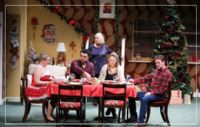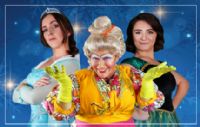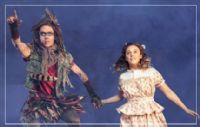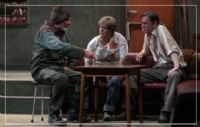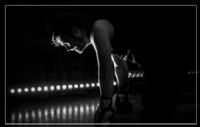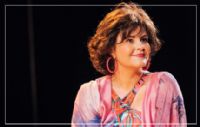Educating Rita
Date: 12/02/2016
Theatre Review
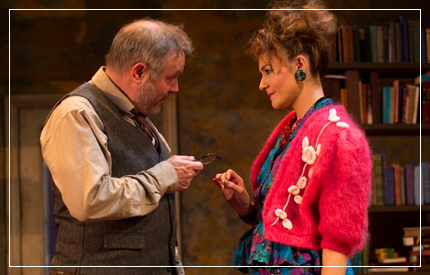
In taking on Willy Russell's Educating Rita at Belfast's Lyric Theatre, Prime Cut's Artistic Director Emma Jordan has set herself the challenge of keeping the essence of Russell's play (later, film) intact in a Belfast setting. That she and cast members Michael James Ford and Kerri Quinn pass this test with flying colours is testament to their skill in both unearthing and highlighting the streamlined soulfulness within a script heavy with emotion, message and, most importantly, laughs.
It's a tour de force for the superb Quinn as the titular Rita, the Eliza Doolittle looking for the Henry Higgins who will (hopefully) lead her into a more literate world. With her hyperactive speech, exaggerated expressionism and colourful clothing (fellow Belfast actress Maria Connolly would be especially proud of Quinn's portrayal) this Belfast broad is no fair lady. But Ford's Frank, her reluctant soon-to-be teacher, is no English gentleman, his profession a means to supporting both himself and his alcohol addiction.
Still, when initially presented, Frank and Rita seem about as far apart on the literature scale as one can possibly imagine. One discounts his teaching ability under a cloud of denial, regret and suppression, yet can't hide his love for literature. The other might confuse Holywood with Hollywood and think "Howard's End" sounds, ahem, rather dodgy, but is lithe, persistent and intuitive.
An enervated professor versus an energetic hairdresser.
Yet both lead troubled personal lives and are on the lookout for true love and genuine respect. Their repeated musings, misunderstandings and revelations will be eye-opening to one another on the long but wholly worthwhile road to a winning conclusion for us, if not necessarily for them.
Backed by Stuart Marshall's atmospheric and expansive set design, Jordan's direction is swift, strong and well punctuated with brief interludes of popular music. A slightly overlong first half where comedy is definitely more prevalent than tragedy - more light-heartedness than heart - nonetheless presents both Ford and Quinn with the chance to fully flesh out Frank and Rita, thus fortifying the power in the second half and ensuring the production transcends its "Pygmalion With Books" feel.
And how. Despite dated values - the play retains its 1980s setting - Educating Rita is as relevant in today's critical and popular culture as it was when Russell first penned it. Here's an example: when Rita reviews a book by simply stating that it's rubbish, she might as well be commenting on the present-day Twitter culture where everyone's a critic. And while Frank maintains his belief in objective criticism against the more bluntly opinionated views of Rita, subjectivity and sentiment are found to be equally important in writing, even the educational sort.
How thin, really, is the line between critic and poet? Aren't some of the best remembered reviews either polarising or written in such a way that the reader can truly think and feel about what they can expect for their money? What is theory on its own barring a simultaneous exhibition of the writer's personality... a gift which he or she should never surrender?
These are just a handful of the elements in Russell's work which Jordan, Ford and Quinn have grasped and dramatised superbly. Beneath all the laughs and comic asides lies the unforced, unfettered and extraordinary subtle transformation of the title character alongside the more curmudgeonly Frank, the former's depiction as a fully-fledged human being who recognises that she must retain her personality but adapt her behaviour. Whether Frank experiences a similar epiphany is slightly more open to question... but what is certain is that the audience are undoubtedly all the better for experiencing Frank and Rita's frolics and foibles.
Simon Fallaha
Educating Rita runs at Belfast's Lyric Theatre until Saturday 05 March.
It's a tour de force for the superb Quinn as the titular Rita, the Eliza Doolittle looking for the Henry Higgins who will (hopefully) lead her into a more literate world. With her hyperactive speech, exaggerated expressionism and colourful clothing (fellow Belfast actress Maria Connolly would be especially proud of Quinn's portrayal) this Belfast broad is no fair lady. But Ford's Frank, her reluctant soon-to-be teacher, is no English gentleman, his profession a means to supporting both himself and his alcohol addiction.
Still, when initially presented, Frank and Rita seem about as far apart on the literature scale as one can possibly imagine. One discounts his teaching ability under a cloud of denial, regret and suppression, yet can't hide his love for literature. The other might confuse Holywood with Hollywood and think "Howard's End" sounds, ahem, rather dodgy, but is lithe, persistent and intuitive.
An enervated professor versus an energetic hairdresser.
Yet both lead troubled personal lives and are on the lookout for true love and genuine respect. Their repeated musings, misunderstandings and revelations will be eye-opening to one another on the long but wholly worthwhile road to a winning conclusion for us, if not necessarily for them.
Backed by Stuart Marshall's atmospheric and expansive set design, Jordan's direction is swift, strong and well punctuated with brief interludes of popular music. A slightly overlong first half where comedy is definitely more prevalent than tragedy - more light-heartedness than heart - nonetheless presents both Ford and Quinn with the chance to fully flesh out Frank and Rita, thus fortifying the power in the second half and ensuring the production transcends its "Pygmalion With Books" feel.
And how. Despite dated values - the play retains its 1980s setting - Educating Rita is as relevant in today's critical and popular culture as it was when Russell first penned it. Here's an example: when Rita reviews a book by simply stating that it's rubbish, she might as well be commenting on the present-day Twitter culture where everyone's a critic. And while Frank maintains his belief in objective criticism against the more bluntly opinionated views of Rita, subjectivity and sentiment are found to be equally important in writing, even the educational sort.
How thin, really, is the line between critic and poet? Aren't some of the best remembered reviews either polarising or written in such a way that the reader can truly think and feel about what they can expect for their money? What is theory on its own barring a simultaneous exhibition of the writer's personality... a gift which he or she should never surrender?
These are just a handful of the elements in Russell's work which Jordan, Ford and Quinn have grasped and dramatised superbly. Beneath all the laughs and comic asides lies the unforced, unfettered and extraordinary subtle transformation of the title character alongside the more curmudgeonly Frank, the former's depiction as a fully-fledged human being who recognises that she must retain her personality but adapt her behaviour. Whether Frank experiences a similar epiphany is slightly more open to question... but what is certain is that the audience are undoubtedly all the better for experiencing Frank and Rita's frolics and foibles.
Simon Fallaha
Educating Rita runs at Belfast's Lyric Theatre until Saturday 05 March.



























